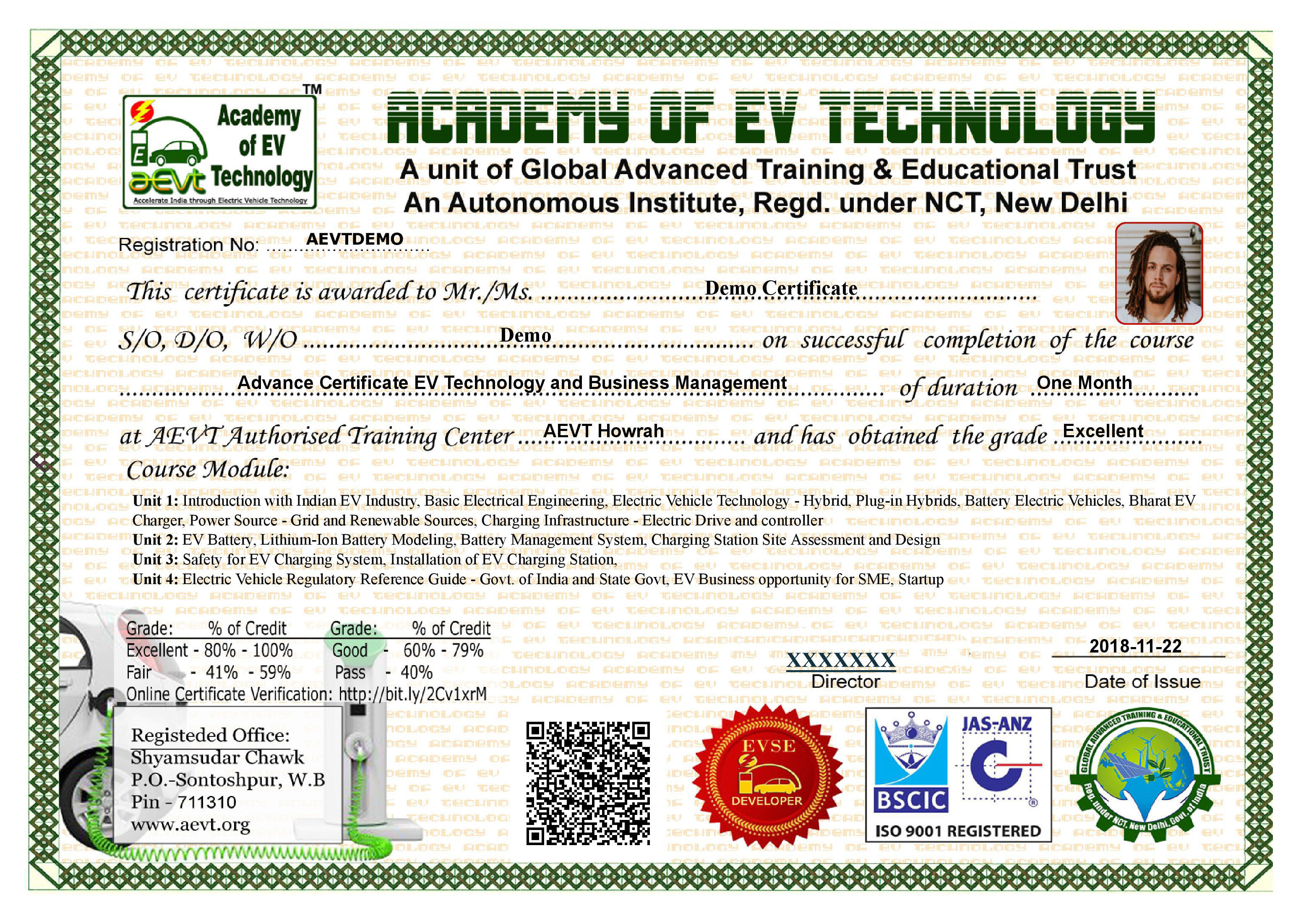Electric Vehicle Course Categories
- Master Degree
- PG Course
- Startups/Business Course
- Job Course
- Research and Development
Masters Degrees (Electric Vehicles)
| Program Title | University | Duration |
|---|---|---|
| Master in Electric Vehicle Engineering | Sweden’s leading university | one-year programme |
| MSc Mobility Engineering | Politecnico | 2 years |
| MSc Automotive Engineering for Electric Vehicles | University of Bedfordshire | 1 yera |
| PG Program in Electric Vehicle Powertrain | Joint program with UPES and Academy of EV Technology | 10 Months |
| Certificate in EV Technology | Joint program with UPES and Academy of EV Technology | 3 Months |
Startups/Business Course
| Program Title | Offered by | Duration |
|---|---|---|
| EV EVSE Business Management Course for Entrepreneurs | Academy of EV Technology | one Month |
| Lithium-ion Battery Pack Assembly Line | Academy of EV Technology | One Month |
| Electric Vehicle Charging Station Design, Installation | Academy of EV Technology | 1 Month |
| Program Title | Offered by | Duration |
|---|---|---|
| PG Program in Electric Vehicle Powertrain | Joint program with UPES and Academy of EV Technology | 10 Months |
| Certificate in EV Technology | Joint program with UPES and Academy of EV Technology | 3 Months |
Electric Bike Design, Servicing & Maintenance Course
(Electric Bike Mechanics Training Course)
E-bike course
Due to huge urbanization and increasing traffic congestion in Indian cities are the main factors to drive the demand for e-bikes. Due to the COVID-19 pandemic in India as well as over the globe, shared mobility for transportation is unlikely to be preferred. E-bikes are considered a safe, convenient, and affordable alternative to public or shared transportation. Also, compared to other transportation systems like electric bus, LCV or cars, e-bikes are cheaper, easier to charge, and do not require huge capital cost to own and investments in supportive infrastructure.
Many start ups have started selling electric bikes in India. Since the demand for e-bikes has increased across the nation over the last few years, manufacturers are planning to expand their facilities to target markets. Leading world manufacturers have also entered the Indian market to capture the growing market demand. Ride-sharing company Ola has entered into an agreement with the Tamil Nadu government and will be investing Rs 2,400 crore for setting up its first electric scooter factory in the state. The company says its factory ola electric bike manufacturing plant will be the largest scooter manufacturing facility in the world that will create nearly 10,000 direct job opportunity.
Electric Bike Technician
Here is s list of the reasons why electric bikes are the money-making engine for the world bicycle industry now:1. Electric bikes are attractive to many who are not "cyclists", but simply need good transportation. Often inside the ever larger cities of the world.
2. Electric bikes are, today, a major portion of the total world bike industry. While numbers are arguable, it appears that out of the 150 million or so bicycles built last year, about 34 million were ebikes. Most sell in Asia, but Europe bought a couple million. And here is a very important fact: Those 34 million electric bikes represent more money than all of the rest of the bikes combined.
3. There are not many people in your town that know how to fix an ebike. Probably not any. That is a big change in situation from being a bike mechanic, working on machines that pretty much everyone thinks they can fix, and with many competitors in most towns.
4. Since ebikes are expensive, the consumer is willing to spend more on maintenance and repair.
5. It is actually easier to repair an ebike electrical problem than to fix mechanical problems on bicycles in general.
WHAT DOES THE COURSE INCLUDE?
- => Basic electrical theory and terminology including understanding wiring diagrams
- => Diagnostic and maintenance procedures for 'intelligent' and 'non-intelligent' systems
- => Test rides on a range of e-bikes with different motors – front hub, rear hub and centre/frame mount motors
- => It provides the skills needed to confidently set up, service and repair a broad spectrum of electric bikes along with an understanding of the specific standards and legal aspects that apply to them.
- Developing practical knowledge and skill on Motor, Controller, Battery Pack Design, BMS, Charger equipments and Charging Station
- Discussion on Industrial scenario and business opportunities
- Unit wise practical Activities
Course Syllabus:
Unit: 1
Unit: 2
- Power Required
- Hill Climbing Power
- Power to Overcome Wind Resistance
- Coefficient of Drag of Shapes of Interest Projected Area of the Bike Rider
- Power to Overcome Rolling Resistance
- Power for Acceleration
- Determining Propulsion Power
- Scaling Road Power to Find Required Motor Power
- Motors Versus Human Muscles for Bike Propulsion
Unit: 3
- Choosing a Frame and Planning Your Design
- Selecting a Frame Dos and Don’ts
- Optimize Your EV
- Standard Measurements and Formulas
- EV Weight
- Aerodynamic Drag Force Defined
- Choose the Lowest Coefficient of Drag
- Relative Wind Contributes to Aerodynamic Drag
- Wheel Well and Underbody Airflow
- Rolling Resistance Defined
- Bike Tires
- Design Your EV
- Horsepower, Torque, and Current, Calculation Overview,Torque-Required
- Worksheet,Torque-Available Worksheet
Unit: 4
- Batteries for Powering Electric Bikes
- Battery Selection Uncertainties
- Measured Energy Comparison in Electric Cars
- Battery Types, Components, and Performance
- Lead-Acid Battery-Its Limits for Electric Bike Propulsion
- Nickel-Cadmium Batteries for Electric Bike Propulsion
- Lithium Ion Batteries for Electric Bike Propulsion
- Charge Control of Long-Life Bike Batteries
- Charging Solutions for Lithium Batteries
- Two-Step Charging, Three-Step Charging
- Charging with Pulses and Rest Periods
Unit: 5
- Brush-and-Commutator Motor
- Induction Motors
- Efficient Permanent Magnet Synchronous Motors
- Motor Characteristics for Electric Bike Propulsion
- Torque-Speed Characteristics
- Motor Output Power
- Gear Ratio Determination
- Mathematical Method for Determining Gear Ratio
- Identification of Motor faults
- Motor repairing
- Different type of Motor Control
- Working princple of Motor Control
- Identification of Motor Control failure
- Controller repairing
- Testing and Troublshooting of Motor Control
Unit: 6
- Maintenance Rules
- Identification - Body Panel, Suspension, braking system, motor and controller system, battery and charger, lighting, instrument, switch
- Maintenance Information - Procedures for removal and installation of scooter body panels
- General Inspection - Appearance inspection, Fixed assembling, Braking system, Electric performance, Wheel-hub motor
- Battery and charger assembly - Battery and charger Parameter, Storage box, Charger socket, Battery Pack test, Charger Inspection, Test of the charger
- Motor/controller/accelerator handle - Technical parameters Inspection, Failure elimination, Inspection of the motor winding resistance, Inspection of the motor insulation, Inspection of the maximum motor no-load current, Inspection of the Hall motor sensor, Controller and Hall cable sensor Inspection
- Suspension system - Front suspension, Failure diagnosis, Steering handle, Front fork, Rear wheel and rear suspension, Failure diagnosis, Motor failure, Rear shock absorber
- Braking system - Failure diagnosis, Front hydraulic brake, Rear hydraulic brake, Adjustment of the rear brake pad, Brake liquid change/air discharging
- Inspection of the vehicle light system - Central control panel assembly
Course Fee
Online Live Class Fees:
Rs. 14999/-
Discount on Live Class Fees= 15%
Online Live Class Fees after discount:
Rs. 12749/-
Hands on Practical Fees: Rs. 4,999/
All Fees including 18% GST
If you are interested to join at Practical session, we will inform you and pay Hands on Practical Fees at that time.
Pay Now Online Live Class Fees only.
Submit Registeration for this course:
Submit Registration
Admission Process
- Submit Registration
- AEVT Admission cell will check form data and they will inform you to pay Course fees
- Deposit Course fees
- Admission cell will send your E-registration certificate and E-library access
- Training cell will send you class schedule
- Trainiers Team will send your class link
- Training cell inform you about practical session at the end of Online live class session
- Exam cell will conduct online examination and send E-Certificate, E-marksheet
- EDP Desk will provide business guide/support for you (https://edpdesk.gatetrust.org )
Become an EV Expert with Verified Skill Certification

1. An Autonomous Institute registered under NCT, Govt. of India under Indian Trust Act.
2. Registered Under NGO-DARPAN, NITI Aayog Govt. of India
3. ISO 9001:2015 registered Educational Trust
4. Registered under 80G and 12A and CSR Act, Govt. of India
5. Practical and Research Lab at GATE Trust Howrah, West Bengal
6. GATE Research - Research unit of Global Advanced Training and Educational Trust. You can Write & Publish a Review/Research paper,
Quick Inquiry Form

Interactive Session

Practical & Doubt Session

E-Library Study Materials

Online Evaluation







